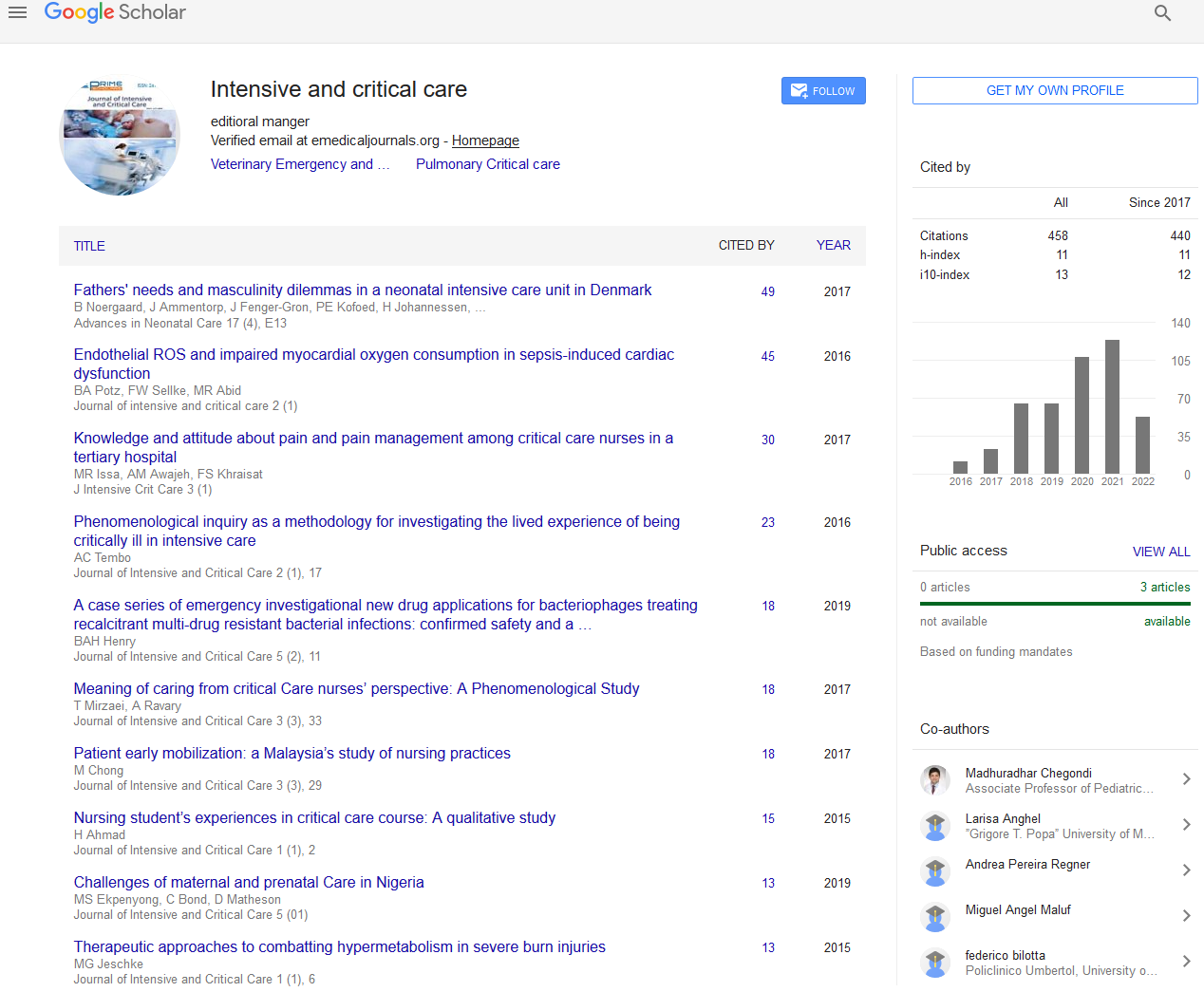Vishakha Shewale*
Msc Biotechnology, Vellore Institute of Technology, Vellore, Tamilnadu, India
- Corresponding Author:
- Vishakha Shewale
Msc Biotechnology, Vellore Institute of Technology
Vellore, Tamilnadu, India
E-mail: shewalev8@gmail.com
Received Date: July 15, 2020; Accepted Date: July 25, 2020; Published Date: July 30, 2020
Citation: Shewale V (2020) Acute Care-Responsibilities of a Nurse. J Intensive & Crit Care Vol.6 No.3:13. doi:10.36648/2471-8505.6.3.13
Copyright: © 2020 Shewale V. This is an open-access article distributed under the terms of the Creative Commons Attribution License, which permits unrestricted use, distribution, and reproduction in any medium, provided the original author and source are credited.
Extended Abstract
Acute care is a branch of healthcare where patients receive
active but short-term treatment for a severe or life-threatening
injury, illness, routine health problems, recovery from surgery, or
acute exacerbation of chronic illnesses.
Acute care settings often include hospitals, Urgent Care
clinics, and surgical clinics. There are many various areas where
acute care is practiced:
• Emergency care
• Urgent care
• Trauma care
• Critical care
• Neonatal and pediatric medical care
• Rehabilitative care
• Psychiatric acute care
• Acute care surgery
Demand for acute care services is additionally often
unpredictable, since someone’s need for care can occur at any
hour of the day on any day of the year. This reality requires some
ongoing investment within the costs required to stay buildings
open and staffed, whether it's a 24-hour facility like an emergency
department or an after-hours clinic.
Finally, acute care encompasses the challenge of providing
standby capacity to accommodate those situations where there's
a public health crisis sort of an influenza epidemic or local tragedy
like a mass shooting.
A nurse in acute care will be responsible for time-sensitive
illnesses and injury, rapid intervention to prevent death or
disability, and restoring optimal health to your patients. In these
sorts of settings, patients can often decline quickly and all of
sudden. Therefore, acute care nurses must be ready to react
quickly and efficiently during high stress situations. Emotions
can run high during these events, especially with severe or lifethreatening
emergencies, in order that they must be ready to
remain professional while practicing empathy for patients and
their families, too.
Acute care nurses use almost all the talents you'll imagine to
worry for these patients. One patient may have labs drawn, an IV
placed for fluids, and an assessment every hour, while another
patient is coding and needing CPR with a rapid response team to
bring them back to life. Acute care nursing means you're using
your critical thinking skills, prioritizing your patients supported
acuity of illness or injury. Once the patient is stable, they're going
to usually be discharged. If the patient is unable to be restored to
relatively better health, they're typically transferred to long-term
care or a neighborhood better suited to treat their condition or
injury, such as a rehabilitation center.
Timely care will only become a priority if clinics, hospital
emergency departments, doctors and nurses, and health systems
face financial or reputational consequences for unfair delays
in responding to patients’ acute needs. Currently there's little
accountability to adopting timeliness as a universal value in
health care.
Finally, acute care must be fully integrated into health reform
efforts that have thus far primarily emphasized improving
look after chronic disease and hospital stays. Yet acute illness
represents a substantial responsibility for the U.S. health care
system. The focus should get on getting the foremost value
for the services that patients receive once they seek look after
their unexpected health needs. This includes getting proper care
quickly at reasonable cost.

